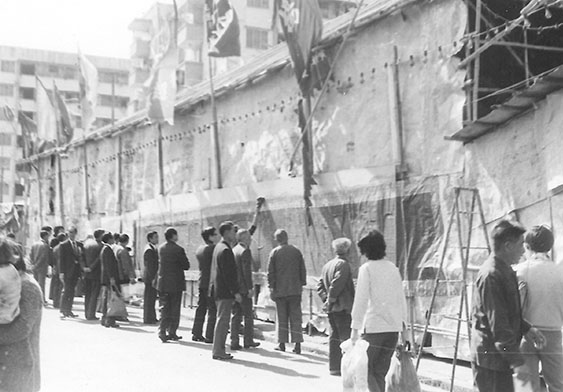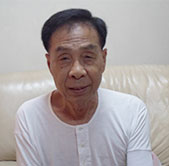
Another shot of participants in the 1966 Nga Tsin Wai Jiao Festival
Nga Tsin Wai’s earliest Jiao festivals all boasted a strong atmosphere, with villagers erecting a makeshift stage in the open space in front of the gatehouse for puppetry performances-Provided by Leung Shek Lun
Another shot of participants in the 1966 Nga Tsin Wai Jiao Festival
Nga Tsin Wai’s earliest Jiao festivals all boasted a strong atmosphere, with villagers erecting a makeshift stage in the open space in front of the gatehouse for puppetry performances-Provided by Leung Shek Lun
Twists and turns in Wan Cheung’s mother’s funeral during the Jiao ritual period
Wan Cheung returned to Po Toi Island during the Japanese occupation. The day after the war ended, Wan Cheung’s mother took him and his brothers and sisters back to Nga Tsin Wai. Tragically, his mother also died soon after at home and her remains were placed in the living room. The day of her funeral happened to be the day of the Jiao ritual and the villagers would not allow Wan Cheung and his siblings to hold a commemorative procession. Wan Cheung’s elder sister therefore sought help from Yau Man Kwong, “Cho Kwun” (or the person-in-charge) of Sit Ying Club (Editor’s Note: It mab be the Sit Ying Sports Association.) With Yau Man Kwong’s help, a funeral for Wan Cheung’s mother’s remains was finally permitted to be held in the wrecked house next to their home. Though there was not much in the way of ceremony at that time, the Government did host a “clean up” operation after the event. Sit Ying Club was located at Lung Kong Road in Kowloon City. Like Ng Wai Chi and Zeng Sheng, Yau Man Kwong was also a member of the Hong Kong guerrillas East River Column. The trio was nicknamed the “Three Musketeers”. Yau Man Kwong’s funeral was a very grand affair, with the funeral procession stretching from Prince Edward Road all the way back to Clear Water Bay Road. Flags at police stations across Hong Kong were also flown at half mast in his honour.


 BACK
BACK  CLOSE
CLOSE 